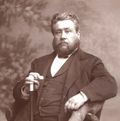But he saveth the poor from the sword, from their mouth, and from the hand of the mighty.(Job 5:15)
So the poor hath hope, and iniquity stoppeth her mouth.(Job 5:16)
Behold, happy is the man whom God correcteth: therefore despise not thou the chastening of the Almighty:(Job 5:17)
For he maketh sore, and bindeth up: he woundeth, and his hands make whole.
He shall deliver thee in six troubles: yea, in seven there shall no evil touch thee.(Job 5:19)
In famine he shall redeem thee from death: and in war from the power of the sword.(Job 5:20)
Thou shalt be hid from the scourge of the tongue: neither shalt thou be afraid of destruction when it cometh.(Job 5:21)
Otras publicaciones relacionadas con "Job 5:18":
Job 5:18 - Referencia Cruzada
See now that I, even I, am he, and there is no god with me: I kill, and I make alive; I wound, and I heal: neither is there any that can deliver out of my hand. (Deuteronomio 32:39)
Moreover the light of the moon shall be as the light of the sun, and the light of the sun shall be sevenfold, as the light of seven days, in the day that the LORD bindeth up the breach of his people, and healeth the stroke of their wound. (Isaías 30:26)
He healeth the broken in heart, and bindeth up their wounds. (Salmos 147:3)
The LORD killeth, and maketh alive: he bringeth down to the grave, and bringeth up. (1 Samuel 2:6)
Come, and let us return unto the LORD: for he hath torn, and he will heal us; he hath smitten, and he will bind us up. (Oseas 6:1)
